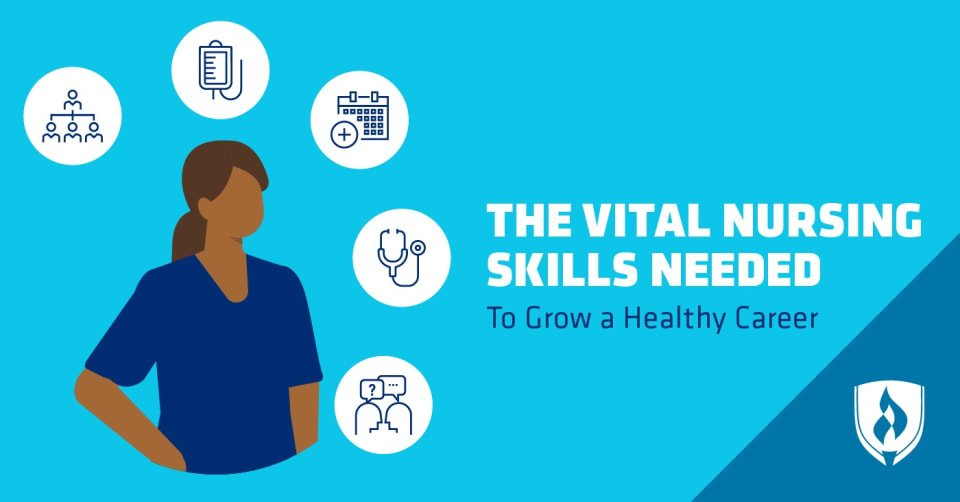
The nursing field offers many paths for those interested in pursuing a hands-on healthcare career—and the job outlook is favorable, too. Case in point? Employment of registered nurses (RNs) is projected to grow at the much-faster-than-average rate of 12 percent through 2028, according to the Bureau of Labor Statistics (BLS).1
Knowing that nurses are in demand is reassuring, but just because the opportunities are out there, doesn’t mean they’ll give them to just anyone. Working in such a high-stakes position means there are some critical skills needed to be a nurse. There are also some other qualities that lend themselves well to the profession.
We’re here to help you better understand the need-to-have technical nursing skills and the helpful-to-have nursing qualities. Whether you’ve acquired some already, or will add them to your toolkit while enrolled in a Nursing program, you’ll know whether you’re ready to launch a successful career in nursing.
Get Your Nursing School Questions Answered at a Nursing Information Session
The must-have clinical skills you’ll need to become a nurse
As a nurse, whenever you’re on a shift, there are patients’ lives on the line. It should come as no surprise that there are many technical nursing skills that are necessary to perform the duties required of you. This is why there are such strict requirements for becoming a nurse.
We used real-time job analysis software to examine more than 1.6 million registered nurse job postings from the past year.2 The data helped us identify the top clinical nursing skills employers are seeking. Here’s what we found:
- Patient care
- Advanced cardiac life support (ACLS)
- Acute care
- Treatment planning
- Cardiopulmonary resuscitation (CPR)
- Telemetry
- Pediatrics
- Life support
- Critical care nursing
- Case management
As you can see, the list above is comprised of very technical nursing skills. Most are not things you can learn on your own. But don’t be intimidated, because these clinical nursing skills are precisely what you’d be trained in as part of a Professional Nursing program.
If you’re unsure of whether you should enroll in Nursing school, learn more about the natural qualities that the best nurses share. You may already possess some of the transferable nursing skills needed to succeed.
The non-clinical nursing skills necessary for success
There’s no doubt that the nursing skills we covered above are essential. But there are also a handful of soft skills that help separate a good nurse from a great one. Find out if you are naturally inclined for a career in nursing.
Effective communication
As a nurse, you’re on the front lines of care. You’re often the middleman, relaying critical information from a physician to a patient. You will also need to be able to foster an open dialogue with patients and their families, so they fully understand their diagnosis, treatment and any other medical concerns.
Effective communication amongst fellow nurses, doctors and other healthcare professionals is also vital as you share the responsibilities of caring for your patients. Additionally, you may find yourself facilitating dialogue with worried or uncooperative patients, concerned family members, busy doctors and everyone in between. Strong communication skills will be crucial for all of the above scenarios.
Flexibility
You never know what you’ll encounter on each nursing shift. Last-minute changes constantly keep you on your toes while you juggle multiple treatment plans, physician’s requests, paperwork and patients’ families. Many nurses would agree that adaptability is one of the most important non-clinical nursing skills.
“You need to be mentally flexible because if you have a patient that is non-compliant or a doctor who is having a bad day, you need to have alternative ways to solve problems and make everyone happy,” says Michelle Katz, LPN, MSN. Without the ability to quickly adapt to changes, a nurse simply can’t keep up.
Critical thinking
A sharp and critical mind is essential for excelling in the nursing field. Nurses must be able to assess a situation and make crucial decisions on the spot. In nursing, there are often multiple options for treatment, which means critical thinking is essential for quickly analyzing a situation and determining the best solution.
Nurses must also be able to swiftly and confidently find best-outcome resolutions in high-pressure scenarios. Because of these reasons, critical thinking skills are invaluable in the nursing profession.
Desire to learn
“The most effective nurses are curious and avid learners,” says Antonio Pizarro, MD.
Earning a Nursing degree doesn’t mean your days as a student are over. The best nurses are the ones who continue to question, explore, learn and develop throughout their entire careers. Because the field of medicine is always changing and evolving, nurses should be prepared to continue learning, adds Fiona Spearing, clinical lead nurse.
“Always ask questions,” Spearing says. “Whether you’re a student nurse or a qualified nurse, there is always something that you can be learning.”
Attention to detail
Paying attention to minute details is important in the nursing profession, especially when you have a lot on your plate. For example, nurses must document everything they do in their patients’ charts. They must listen closely to their description of symptoms, ask the right questions and remember to bring medications at appropriate times.
It’s critical to remember even the smallest detail amidst all of the commotion. At the end of the day, one small slip-up could become a fatal mistake. The best nurses are naturally detail-oriented.
Developing nursing skills for your resume
If you can relate to some of the non-clinical nursing skills we just covered, you’re already well equipped to join the field. Having these inherent skills is a promising sign that you’re well suited to be a great nurse. The next step is to start honing the technical skills required for nursing.
The best way to master these clinical nursing skills is to enroll in and graduate from a Nursing program. Learn more about how to start that process in our article, “Your Step-by-Step Guide for Getting Into Nursing School.”
Related Articles:
1Bureau of Labor Statistics, U.S. Department of Labor, Occupational Outlook Handbook, [career information accessed August 5, 2018]. Information represents national, averaged data for the occupations listed and include workers at all levels of education and experience. Employment conditions in your area may vary.
2Burning-Glass.com (analysis of 1,650,058 registered nurse job postings, Aug. 01, 2019 – Jul. 31, 2020).
EDITOR’S NOTE: This article was originally published in 2012. It has since been updated to reflect information relevant to 2020. Insight from Katz, Pizzaro and Spearing remain from original article.




